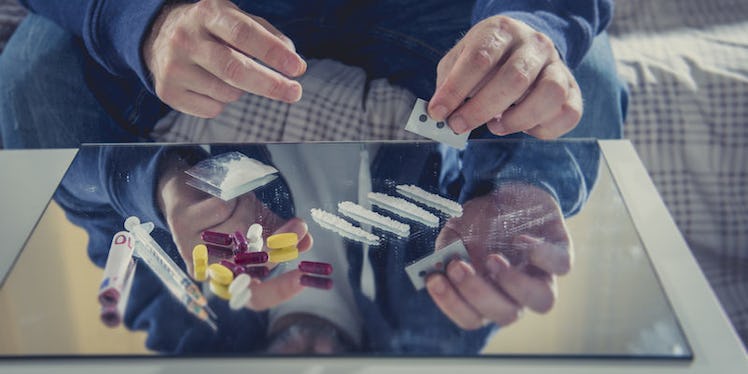Vices are not crimes. And, while drug use (or drug abuse) certainly qualifies as a vice, the force of law does not need to punish those who do it.
Mere legalization does not necessarily mean something is condoned. After all, should other vices, like being mean-spirited be illegal? What about alcohol and tobacco, which kill many more people than any other drug?
Freedom is one of the core principles of American society, which includes the freedom to make mistakes. It's not like legalizing drugs changes said fact, since drugs are readily available. Would you suddenly go and shoot up heroin if it became legal?
A drug user hurts no one but him or herself, and it makes no sense to compound this by locking these people in prison. Of course, if someone commits a crime as a result of drug use, he or she is still responsible for the crime.
That being said, drug addicts need help, not prison.
Just like the prohibition of alcohol didn’t work in the 1920s, the prohibition of drugs doesn’t work today. Instead, it simply leads to a myriad of unintended consequences throughout society.
Today, the United States has the largest prison population in the world. Americans make up only 5 percent of the world’s population, but 25 percent of the world's total prison population.
A very large number of American inmates are incarcerated for drug offenses. And, a disproportionate number of those inmates are minorities, despite having similar rates of drug use.
What do we have to show for this? Well, according to the National Institute of Drug Abuse,
“Illicit drug use in America has been increasing. In 2012, an estimated 23.9 million Americans aged 12 or older — or 9.2 percent of the population — had used an illicit drug or abused a psychotherapeutic medication (such as a pain reliever, stimulant, or tranquilizer) in the past month. This is up from 8.3 percent in 2002.”
It is nothing more than utopian nonsense to believe we can stop people from buying and using drugs that are so easily accessible. Instead, drug prohibition creates a massive black market, which criminal gangs control and profit from.
Mexico has all but turned into a narco state because of the power such cartels have. And, those cartels gain such power from the profits the War on Drugs enabled. Just as Prohibition gave rise to the mafia, drug prohibition gave rise to the Latin American drug cartels.
Al Capone and Pablo Escobar might as well have been the same person. In other words, the drug war creates crime, it doesn’t solve it.
It’s not just the cartels, however.
How many young kids in impoverished neighborhoods have turned to selling drugs as a way to make money for their families? Many of these kids have an entrepreneurial ability that could be harnessed for good, but instead, such smarts are wasted on the illicit drug trade and the subsequent violence.
Furthermore, when it comes to “victimless crimes,” they’re not exactly easy to spot. Most drug use is done in private and none of the participants want the police to get involved for obvious reasons.
So, this requires incredibly invasive government action. The ACLU notes that every day, there are “124 violent SWAT raids.”
Sometimes, the results of such raids are truly heartbreaking. For example, David Hooks was killed on one such raid when he was shot in the head and back while face down on the ground.
Indeed, the War on Drugs has been a major impetus in the militarization of the American police force, which is, perhaps, the greatest threat to freedom we now face.
Even the NSA has gotten involved, as a memo from the agency noted it is "blurring the lines" between terrorism and drugs.
So, it's quite obvious the War on Drugs has had many negative effects on our society. But, what are the results of legalization?
Well, there are some very positive examples to point to, particularly Portugal, as a recent Forbes headline proclaimed, “Ten Years After Decriminalization, Drug Abuse Down by Half in Portugal.”
And, a report by the Brookings Institute finds that marijuana legalization in Colorado has been “largely successful.”
Indeed, my one fear in legalizing drugs is it might lead to an increase in drug use, but even that appears to be questionable as the results from Portugal show.
And, ending the War on Drugs would certainly put an end to the black markets associated with drug trafficking while dealing a major blow to the cartels that profit from them.
It would also increase personal freedom and remove the excuse for the federal government to violate civil liberties.
To put it bluntly, the results have been crystal clear: The War on Drugs has been a colossal failure.
It’s time to try to something different.
